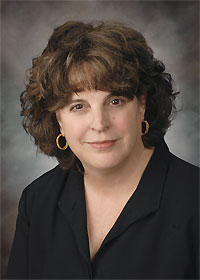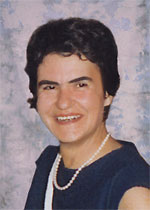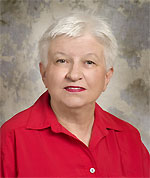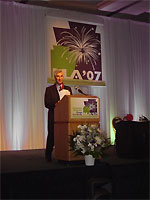 Library faculty and staff invite you to join us in welcoming Mary Moore, Ph.D. as its third director on September 1, 2007. Dr. Moore comes to the Miller School of Medicine as executive director of the Louis Calder Memorial Library and deputy University librarian for health sciences. She has an outstanding record of innovative leadership in medical and academic libraries and expertise in public health of Hispanic populations.
Library faculty and staff invite you to join us in welcoming Mary Moore, Ph.D. as its third director on September 1, 2007. Dr. Moore comes to the Miller School of Medicine as executive director of the Louis Calder Memorial Library and deputy University librarian for health sciences. She has an outstanding record of innovative leadership in medical and academic libraries and expertise in public health of Hispanic populations.
In Dean Goldschmidt's words: "� her novel use of technology and her ability to build research communities will be tremendous assets to the faculty and staff of the Miller School." Dr. Moore sees innovation and communities as closely tied and involving initiatives such as librarians supporting �collaboratories�, where users can access interactive tools such as electronic white boards and mind mapping software; research review boards; literature reviews for innovative patient care; easier and more comprehensive literature searches; and patient access to current research results.
Dr. Moore's prior appointment was at the University of Texas Health Science Center in San Antonio, where she served as executive director of libraries and knowledge management of its five library system and oversaw a staff of 60 and a budget of $4.5 million. Previously, she was head of reference and customer services at the National Library of Medicine of the National Institutes of Health under UM President Donna Shalala.
back to top of page
 The Library is pleased to announce the establishment of the Margita Zakarija, M.D. Medical Library Fund for the purchase of resources related to the field of thyroid disease. Initiated by faculty in the Division of Endocrinology, Diabetes and Metabolism, the Fund honors a colleague who left a legacy of excellence in research, teaching and patient care.
The Library is pleased to announce the establishment of the Margita Zakarija, M.D. Medical Library Fund for the purchase of resources related to the field of thyroid disease. Initiated by faculty in the Division of Endocrinology, Diabetes and Metabolism, the Fund honors a colleague who left a legacy of excellence in research, teaching and patient care.
Margita (Gita) Zakarija, M.D., M.Sc. (1937-2006) was Professor of Medicine and of Microbiology and Immunology at the Miller School of Medicine.
When Dr. J. Maxwell McKenzie moved to Miami in 1981 to become Chairman of Medicine, Dr. Zakarija took up the position of Director of the Thyroid Research and Clinical Laboratory in the Department's Division of Endocrinology, Diabetes and Metabolism. Thereafter, she provided oversight for a very highly regarded clinical reference laboratory for thyroid tests and continued an increasingly productive research career.
Her major investigative interests focused on the role of immune mechanisms in various forms of thyroid overactivity and thyroid deficiency. She was able to demonstrate that in many patients with thyroid disease both thyroid-stimulating and thyroid-inhibiting substances are present in the blood, with the clinical manifestations dependent on the relative amounts and effectiveness of these opposing immune substances at any given time. Her studies also shed new light on the basis for thyroid disease in pregnancy and in the new-born and contributed significantly to improving treatment of these conditions. She was much-admired by her patients and trainees for her skill and dedication to patient care. Another important area of research, carried out in collaboration with a faculty colleague studying the epidemiology of mental illness in Amish families in Pennsylvania, related to the prevalence of thyroid abnormalities in this population.
Contributions in memory of Dr. Zakarija are invited from all who valued her life and work and should be made payable to the Margita Zakarija, M.D. Medical Library Fund and sent to the Calder Medical Library (Attention: Frank Yanes), University of Miami Miller School of Medicine, P.O. Box 016950, Miami, FL 33101. The Margita Zakarija, M.D. Medical Library Endowment will be created from the Fund as soon as twenty thousand dollars have been received. At that time, resources related to thyroid disease will be purchased with spending distributions from the endowment; each such acquisition will bear a suitable Memorial Bookplate. Should the threshold not be reached, contributions will be directed to current use funds for purchase of materials in similar areas of concentration.
back to top of page
 On June 29, 2007, the Library and Biomedical Communications bid a fond adieu to its longest serving and one of its most dedicated and loyal staff members. Mrs. Ramute Bergstrom joined the medical library administration staff in 1976 as an assistant to the Library Director, Mrs. Mildred C. Langner at the time. Three years later, Mr. Henry L. Lemkau, Jr. succeeded Mrs. Langner and in 1982 Ramute was promoted to Administrative Assistant for Administration, a position she held until her retirement in January, 2007. To help train her successor, Ms. Gretel Rodriguez, and assist with the transition following Mr. Lemkau's retirement in December, 2006, Ramute served as a working retiree until June 30th.
On June 29, 2007, the Library and Biomedical Communications bid a fond adieu to its longest serving and one of its most dedicated and loyal staff members. Mrs. Ramute Bergstrom joined the medical library administration staff in 1976 as an assistant to the Library Director, Mrs. Mildred C. Langner at the time. Three years later, Mr. Henry L. Lemkau, Jr. succeeded Mrs. Langner and in 1982 Ramute was promoted to Administrative Assistant for Administration, a position she held until her retirement in January, 2007. To help train her successor, Ms. Gretel Rodriguez, and assist with the transition following Mr. Lemkau's retirement in December, 2006, Ramute served as a working retiree until June 30th.
To everyone in the department and many throughout the medical center, Ramute has been the face of the administrative staff. She served tirelessly and with deep caring and commitment to each individual, the department, the School, the University and the community. Her colleagues and many friends throughout the Medical Center extend their deep appreciation to her and wish her a long, healthy and happy retirement.
back to top of page
 Professor Emeritus Henry L. Lemkau, Jr. delivered the 2007 Janet Doe Lecture on the history or philosophy of medical librarianship at the Annual Meeting of the Medical Library Association, May 21st, in Philadelphia. Titled "Constants, Context, Change and the Pursuit of Purpose," Lemkau examined the medical library profession in the contexts of the culture of the professions and institutions it serves and the social and cultural worlds in which it functions. The Doe Lecture is the Association's most distinguished lecture. It will be published in the Journal of the Medical Library Association.
Professor Emeritus Henry L. Lemkau, Jr. delivered the 2007 Janet Doe Lecture on the history or philosophy of medical librarianship at the Annual Meeting of the Medical Library Association, May 21st, in Philadelphia. Titled "Constants, Context, Change and the Pursuit of Purpose," Lemkau examined the medical library profession in the contexts of the culture of the professions and institutions it serves and the social and cultural worlds in which it functions. The Doe Lecture is the Association's most distinguished lecture. It will be published in the Journal of the Medical Library Association.
back to top of page
The University of Miami Libraries have acquired:
The Academic OneFile, with 3,800 full text journals. Links to the 800 full text health sciences journals in this database have been added to the Calder Library's E-Journals: A-Z list.
The Academic Search Premier database, with 4,500 full text journals. 33% of the journals are in the health sciences, and links have been added to the Calder Library's E-Journals: A-Z list.
Two new Books@Ovid: Marino's The ICU Book, 3rd ed., Lippincott Williams & Wilkins, 2006 and Tasman's Duane's Ophthalmology, rev. ed., Lippincott Williams & Wilkins, 2007. The books appear in the E-Books link alphabetically by title and under the Critical Care and Ophthalmology subject links respectively.
The Chicago Manual of Style, an important and heavily used reference. It is accessible under the Writer's Tools subject link in the Internet Catalog and the E-Books list, as well as by title in the latter.
The EcoSal database, published by the American Society for Microbiology. It "serves the needs of the E. coli/Salmonella research community as a comprehensive archive of the entire corpus of knowledge about the enteric bacterial cell." EcoSal appears in the Electronic Databases link and in the Internet Catalog under the Immunology and Microbiology link.
The History of Science, Technology, and Medicine database, which contains journal articles, conference proceedings, books, book reviews, and dissertations published since 1975 and includes the Welcome Library for the History and Understanding of Medicine file. The database appears in the Electronic Databases link and in the Internet Catalog under History of Medicine.
The Sage Premier and Deep Backfile collections, which accord access to more than 100 health sciences journals, from volume 1 through to the present. Published by Sage Publications, links to these journals are now accessible on the E-Journals: A-Z link.
Improvements to existing resources include:
DynaMed's new links to full text EBSCO databases, such as Academic Search Premier and Business Search Premier. DynaMed also links to PubMed citations and abstracts, which contain links to the full text. However, the PubMed links are currently working only for freely accessible electronic journals. EBSCO is working on making the PubMed links operable for subscription-based electronic journals as well.
Natural Standard's new 'Advanced Interactions Checker' which allows users to find possible interactions between specific herbs, supplements, drugs and brand name products. A good example is Aspirin, Ginkgo, Warfarin, and Yohimbe bark extract.
UpToDate�s new search engine which allows users to:
- Enter multiple terms - phrases, questions - for more specific search statements and resulting retrival. For information on how to treat hypertension in pregnancy, for example, enter: treatment of hypertension in pregnancy for the best topic matches.
- Look at the outline of a retrieved topic by placing the mouse over the topic title.
Web of Science's new 'Distinct Author Identification System,' which makes it easier for searchers to find the exact author they seek. Distinct Author Sets are routinely presented on the results page of an author search and include the number of records, source journals, publication years, and subject areas. Web of Science appears on the Web of Knowledge portal.
DynaMed, Natural Standard and Web of Knowledge appear under Quick Links on the Library's website.
back to top of page
New Journal Locations:
| 2003 to date: |
|
First Floor |
| 1961 - 2002: |
|
Second Floor |
| 1960 and before: |
|
Lower Level |
New Drink Policy:
Effective May 1, 2007, drinks in containers with lids are permissible throughout the Library, except in the Emanuel M. Papper, M.D History of Medicine Room and the Electronic Classroom.
New Book Display Area:
Newly acquired books are now shelved for your convenience on the first floor on shelves that previously housed hundreds of current journal issues. The current issue of the following journals continues to be housed on these shelves: BMJ, JAMA, Lancet, Nature, New England Journal of Medicine, and Science.
New Public Access Computer Software:
All public access computers on the first floor, except the four on the counter for searches of the Library's catalog, now have the Microsoft Office and Citrix software installed.
Library News Monitor:
A monitor at the entrance displays important Library news items of interest to patrons.
back to top of page
 Library faculty and staff invite you to join us in welcoming Mary Moore, Ph.D. as its third director on September 1, 2007. Dr. Moore comes to the Miller School of Medicine as executive director of the Louis Calder Memorial Library and deputy University librarian for health sciences. She has an outstanding record of innovative leadership in medical and academic libraries and expertise in public health of Hispanic populations.
Library faculty and staff invite you to join us in welcoming Mary Moore, Ph.D. as its third director on September 1, 2007. Dr. Moore comes to the Miller School of Medicine as executive director of the Louis Calder Memorial Library and deputy University librarian for health sciences. She has an outstanding record of innovative leadership in medical and academic libraries and expertise in public health of Hispanic populations.
 The Library is pleased to announce the establishment of the Margita Zakarija, M.D. Medical Library Fund for the purchase of resources related to the field of thyroid disease. Initiated by faculty in the Division of Endocrinology, Diabetes and Metabolism, the Fund honors a colleague who left a legacy of excellence in research, teaching and patient care.
The Library is pleased to announce the establishment of the Margita Zakarija, M.D. Medical Library Fund for the purchase of resources related to the field of thyroid disease. Initiated by faculty in the Division of Endocrinology, Diabetes and Metabolism, the Fund honors a colleague who left a legacy of excellence in research, teaching and patient care.  On June 29, 2007, the Library and Biomedical Communications bid a fond adieu to its longest serving and one of its most dedicated and loyal staff members. Mrs. Ramute Bergstrom joined the medical library administration staff in 1976 as an assistant to the Library Director, Mrs. Mildred C. Langner at the time. Three years later, Mr. Henry L. Lemkau, Jr. succeeded Mrs. Langner and in 1982 Ramute was promoted to Administrative Assistant for Administration, a position she held until her retirement in January, 2007. To help train her successor, Ms. Gretel Rodriguez, and assist with the transition following Mr. Lemkau's retirement in December, 2006, Ramute served as a working retiree until June 30th.
On June 29, 2007, the Library and Biomedical Communications bid a fond adieu to its longest serving and one of its most dedicated and loyal staff members. Mrs. Ramute Bergstrom joined the medical library administration staff in 1976 as an assistant to the Library Director, Mrs. Mildred C. Langner at the time. Three years later, Mr. Henry L. Lemkau, Jr. succeeded Mrs. Langner and in 1982 Ramute was promoted to Administrative Assistant for Administration, a position she held until her retirement in January, 2007. To help train her successor, Ms. Gretel Rodriguez, and assist with the transition following Mr. Lemkau's retirement in December, 2006, Ramute served as a working retiree until June 30th. Professor Emeritus Henry L. Lemkau, Jr. delivered the 2007 Janet Doe Lecture on the history or philosophy of medical librarianship at the Annual Meeting of the Medical Library Association, May 21st, in Philadelphia. Titled "Constants, Context, Change and the Pursuit of Purpose," Lemkau examined the medical library profession in the contexts of the culture of the professions and institutions it serves and the social and cultural worlds in which it functions. The Doe Lecture is the Association's most distinguished lecture. It will be published in the Journal of the Medical Library Association.
Professor Emeritus Henry L. Lemkau, Jr. delivered the 2007 Janet Doe Lecture on the history or philosophy of medical librarianship at the Annual Meeting of the Medical Library Association, May 21st, in Philadelphia. Titled "Constants, Context, Change and the Pursuit of Purpose," Lemkau examined the medical library profession in the contexts of the culture of the professions and institutions it serves and the social and cultural worlds in which it functions. The Doe Lecture is the Association's most distinguished lecture. It will be published in the Journal of the Medical Library Association.